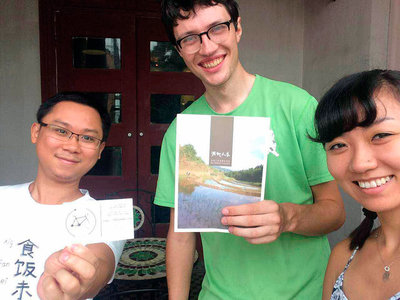
Since accepting some of China’s first formal NGOs in 1990, the Pearl River Delta has experienced a burgeoning civil society movement. Rice Harmony is a social enterprise that operates throughout the region using a rice-exclusive organic CSA (community-supported agriculture) model. Customers subscribe on a yearly basis for periodic deliveries of rice sustainably grown in a nearby county.
The company’s energetic, soft-spoken founder, Liu Shangwen, says the idea for the company came out of his earlier work with environmental NGOs. On a tour through the region in 2005, he met farmers in village after village with peeling, irritated and decaying skin that they attributed to pesticide-intensive farming techniques. When he broached the subject with colleagues, Liu learned that these same techniques had significantly higher greenhouse gas emissions when compared with organics.
Largely due to disruptions in its glacier-fed water supply, China faces one of the grimmest climate change futures among populous nations. The arid north, the cradle of Han civilization, is already experiencing dropping water tables, a loss of fertile land and runaway desertification.
According to Liu, “Everyone understood the problem, but [there were] no alternatives.” Looking abroad, he learned of organic CSA models practiced in Japan and Europe, and began to ask himself, “Why not in China?” Higher priced markets were becoming available to more and more Chinese consumers, who were also increasingly worried about their health.
So he went back to the country. He searched in his free time and talked to farmers. Eventually, in 2012, six households in Qingyuan village, Guangdong started cultivation on their first crop of “ecological” rice. A quarter of the village’s 200 households have since adopted the company’s standards.
Despite their success on the production side, CEO Linda Tan says that building a consumer base has become their most relentless challenge. In the wake of repeated contamination scares, Chinese consumers have increasingly relied on name brands and obsessive overpackaging as indicators of food safety.
More importantly, Tan says, it’s a matter of “[getting] people to understand that, as a consumer, they have a vote.” This idea has been drilled into Western skulls over the past century, but it feels foreign in a China only recently opened to non-governmental social action. Even in the Pearl River Delta, a city with a rapidly growing civil society movement, the idea that everyday people can or should do anything about such large-scale issues is uncommon.
As the promise of a healthier life and higher profits leads to a steady adoption of their farming standards, Rice Harmony continues to teeter on the brink of oversupply. Without preservatives to keep their rice fresh, they could be forced to dump supply in low-price markets.
Whatever the future holds for Rice Harmony, Tan believes in the social impacts of civil society. “My youngest employee is just 20, and his parents recently helped him get a loan for a car so he can Uber in his spare time. Parents in Southern China put so much pressure on their sons to make money quickly. I think if [young people] can just get a taste of volunteer work, it makes a big difference in their outlook on life.” — Forrest Watkins